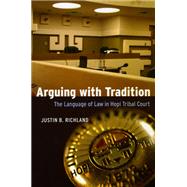
Note: Supplemental materials are not guaranteed with Rental or Used book purchases.
Purchase Benefits
Looking to rent a book? Rent Arguing with Tradition: The Language of Law in Hopi Tribal Court [ISBN: 9780226712956] for the semester, quarter, and short term or search our site for other textbooks by Richland, Justin B.. Renting a textbook can save you up to 90% from the cost of buying.
| List of Illustrations | p. ix |
| Acknowledgments | p. xi |
| Introduction: Arguing with Tradition in Native America | p. 1 |
| The Ironies of Indigeneity | p. 1 |
| Native American Tribal Law and Tradition | p. 3 |
| "Anglo" Law in Indian Country: Courts of Indian Offenses | p. 8 |
| Tribal Courts Today: At the Edge of Tribal Sovereignty | p. 12 |
| The Dearth of Ethnographies of Tribal Courts | p. 17 |
| The Approach and Aims of This Study | p. 22 |
| An Outline of This Study | p. 23 |
| Making a Hopi Nation: "Anglo" Law Comes to Hopi Country | p. 27 |
| Hopi Tribal Governance | p. 32 |
| Hopi Village Organization and Governance | p. 34 |
| Court Comes to Hopi Country | p. 37 |
| The Hopi Tribal Court Today | p. 41 |
| Data and Methodologies: Talking Tradition in Hopi Property Disputes | p. 52 |
| "What are you going to do with the village's knowledge?" Language Ideologies and Legal Power in Hopi Tribal Court | p. 59 |
| Legal Discourse Analysis and Legal Power | p. 61 |
| Language Ideologies, Metadiscourse, and Metapragmatics | p. 64 |
| Talking Tradition, Talking Law in Hopi Courtroom Interactions | p. 66 |
| The Language Ideologies of Anglo-American Law versus Hopi Traditional Authority | p. 79 |
| Conclusion | p. 86 |
| "He could not speak Hopi.... That puzzle- puzzled me": The Pragmatic Paradoxes of Hopi Tradition in Court | p. 89 |
| Paradox in the Pragmatics of Language and Law | p. 92 |
| Discourses of Cultural Difference in Hopi Court | p. 97 |
| Iterations of Indigeneity in a Hopi Court Hearing | p. 100 |
| Conclusion | p. 112 |
| Suffering into Truth: Hopi Law as Narrative Interaction | p. 115 |
| Legal Narrativity in and out of Court | p. 116 |
| A Model of Hopi Law as Narrative Interaction | p. 120 |
| The Significance of Settings: Judicial Openings of Hopi Courtroom Narrative | p. 122 |
| The Contested Narrativity of a Hopi Property Proceeding | p. 128 |
| Conclusion | p. 142 |
| Conclusion: Arguments with Tradition | p. 147 |
| Tradition, Culture, and the Politics of Authenticity | p. 150 |
| The "Politics" of Multiculturalism and Native Culture | p. 154 |
| Arguing with Tradition | p. 157 |
| Notes | p. 163 |
| References | p. 169 |
| Index | p. 179 |
| Table of Contents provided by Ingram. All Rights Reserved. |
The New copy of this book will include any supplemental materials advertised. Please check the title of the book to determine if it should include any access cards, study guides, lab manuals, CDs, etc.
The Used, Rental and eBook copies of this book are not guaranteed to include any supplemental materials. Typically, only the book itself is included. This is true even if the title states it includes any access cards, study guides, lab manuals, CDs, etc.